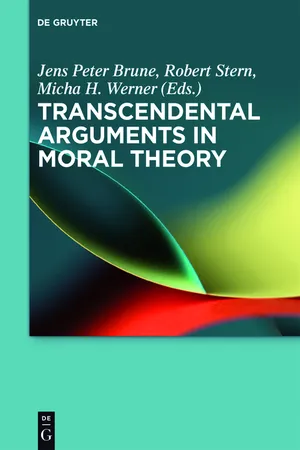
- 364 pages
- English
- ePUB (mobile friendly)
- Available on iOS & Android
Transcendental Arguments in Moral Theory
About This Book
Since Barry Stroud's classic paper in 1968, the general discussion on transcendental arguments tends to focus on examples from theoretical philosophy. It also tends to be pessimistic, or at least extremely reluctant, about the potential of this kind of arguments. Nevertheless, transcendental reasoning continues to play a prominent role in some recent approaches to moral philosophy. Moreover, some authors argue that transcendental arguments may be more promising in moral philosophy than they are in theoretical contexts.
Against this background, the current volume focuses on transcendental arguments in practical philosophy. Experts from different countries and branches of philosophy share their views about whether there are actually differences between "theoretical" and "practical" uses of transcendental arguments. They examine and compare different versions of transcendental arguments in moral philosophy, explain their structure, and assess their respective problems and promises.
This book offers all those interested in ethics, meta-ethics, or epistemology a more comprehensive understanding of transcendental arguments. It also provides them with new insights into uses of transcendental reasoning in moral philosophy.
Frequently asked questions
Information
Index
- Abduction / abductive 1, 2, 3
- Adey, Glyn 1
- Agamben, Giorgio 1, 2
- Agency 1, 2, 3, 4, 5, 6, 7, 8, 9, 10, 11, 12, 13, 14, 15, 16, 17, 18, 19, 20, 21, 22, 23, 24, 25, 26, 27, 28, 29, 30, 31, 32, 33, 34, 35, 36, 37
- Agrippa 1
- Albert, Hans 1, 2, 3
- Alford, C. Fred 1, 2
- Allison, Henry E. 1, 2, 3, 4, 5, 6
- Alston, William P. 1, 2
- Amoralism 1, 2, 3
- Angle, Stephen C. 1
- Analytic-Synthetic-Distinction 1, 2, 3, 4, 5, 6, 7
- Anscombe, Gertrude Elizabeth Margaret 1
- Anti-realism: see realism
- Apel, Karl-Otto 1, 2, 3, 4, 5, 6, 7, 8, 9, 10, 11, 12, 13, 14, 15, 16, 17, 18, 19, 20, 21, 22, 23, 24, 25, 26, 27, 28, 29, 30, 31, 32
- Apperception: see perception
- Appropriateness (Condition) 1, 2, 3, 4
- Aquila, Richard E. 1
- Aquinas, Thomas 1, 2, 3
- Aristotle 1, 2, 3, 4, 5, 6, 7, 8, 9, 10, 11, 12, 13, 14
- Audi, Robert 1
- Augustine of Hippo 1
- Austin, John Langshaw 1, 2
- Autonomy 1, 2, 3, 4, 5, 6, 7, 8, 9, 10, 11, 12, 13, 14
- Badenhop, Dennis 1, 2
- Bagnoli, Carla 1, 2, 3, 4
- Baiasu, Sorin 1, 2, 3
- Bauhn, Per 1, 2, 3
- Baylis, Charles A. 1
- Baynes, Kenneth 1
- Bedde, Derk 1
- Beyleveld, Deryck 1, 2, 3, 4, 5, 6, 7, 8, 9
- Böhler, Dietrich 1, 2, 3, 4, 5, 6
- Bohman, James 1, 2
- Bonjour, Laurence 1, 2
- Bowers, Fredson 1
- Boylan, Michael 1, 2
- Brady, Michael 1
- Brain in a vat 1
- Brandom, Robert B. 1, 2, 3, 4, 5
- Bratman, Michael E. 1, 2
- Breuer, Markus 1
- Brink, David O. 1
- Brown Jessica 1, 2
- Brueckner, Anthony L. 1, 2, 3, 4
- Brune, Jens Peter 1, 2, 3
- Bülow, Christopher 1
- Burckhart, Holger 1, 2
- Burkhardt, Frederick H. 1
- Burks, Arthur W. 1, 2
- Burnyeat, Myles F. 1, 2
- Cappelen, Herman 1, 2
- Castoriadis, Cornelius 1, 2, 3, 4, 5
- Categorical / categorical imperative 1, 2, 3, 4, 5, 6, 7, 8, 9, 10, 11, 12, 13, 14, 15, 16, 17, 18, 19
- –Formula of Humanity 1, 2, 3, 4, 5
- –Formula of Universal Law 1, 2
- Cavell, Stanley 1, 2
- Chan, Wing-tsit 1, 2
- Chase, James 1, 2
- Cicero 1
- Claassen, Rutger 1, 2
- Cogito ergo sum 1, 2, 3
- Cohen, Gerald A. 1, 2
- Coherentism 1, 2, 3, 4, 5, 6, 7, 8, 9, 10, 11, 12, 13, 14, 15, 16, 17
- Coleman, Mary Clayton 1, 2
- Confucius 1, 2, 3
- Consequentialism 1, 2, 3
- Constitutivism: see constructivism
- Constructivism / Constitutivism 1, 2, 3, 4, 5, 6, 7
- Cooke, Mave 1, 2
- Crisp, Roger 1, 2
- Danielsson, Sven 1, 2
- Darwall, Stephen L. 1, 2, 3, 4, 5, 6, 7, 8, 9, 10, 11, 12, 13, 14, 15
- Dean, Richard 1, 2
- Deduction / deductive 1
- Deliberation 1
- Demonizing 1
- Desires 1
- Descartes, René 1, 2, 3, 4
- Dialectically necessary method 1, 2
- Dialog / dialogical 1, 2, 3, 4, 5, 6, 7, 8, 9, 10, 11, 12, 13, 14, 15, 16, 17, 18, 19, 20
- Di Giovanni, George 1
- Discourse ethics 1, 2, 3, 4, 5, 6, 7, 8, 9, 10, 11, 12
- Dogmatism 1, 2
- Dostoyevsky, Fjodor 1
- Dorschel, Andreas 1, 2
- Düring, Dascha 1, 2
- Düwell, Marcus 1, 2, 3, 4
- Egoism 1, 2, 3
- Egonsson, Dan 1
- Error theory 1
- Enoch, David 1, 2, 3, 4, 5, 6, 7, 8, 9, 10, 11
- Eupraxia 1
- Evil 1, 2, 3, 4, 5, 6, 7, 8, 9
- Evil demon 1, 2
- Ewing, Alfred Cyril 1, 2, 3, 4
- Externalism 160, 1
- F...
Table of contents
- Cover
- Title Page
- Copyright
- Table of Contents
- Introduction
- A Reflexions on the general structure and problems of transcendental arguments
- B Uses and discussions of transcendental reasoning based on the self-reflective structure of personal autonomy, rational agency, or human self-understanding
- C Transcendental reasoning inspired by pragmatism, linguistics, and theories of intersubjectivity
- Notes on Contributors
- Index